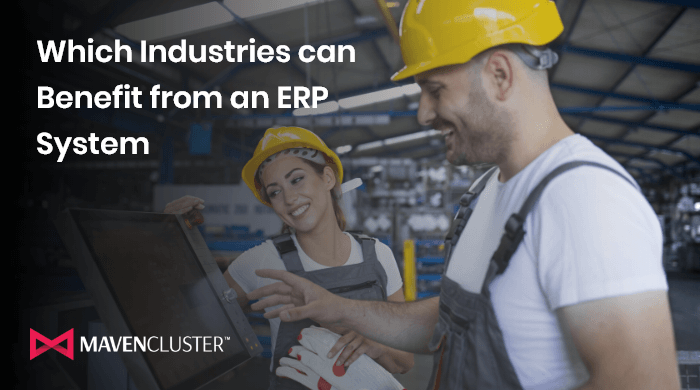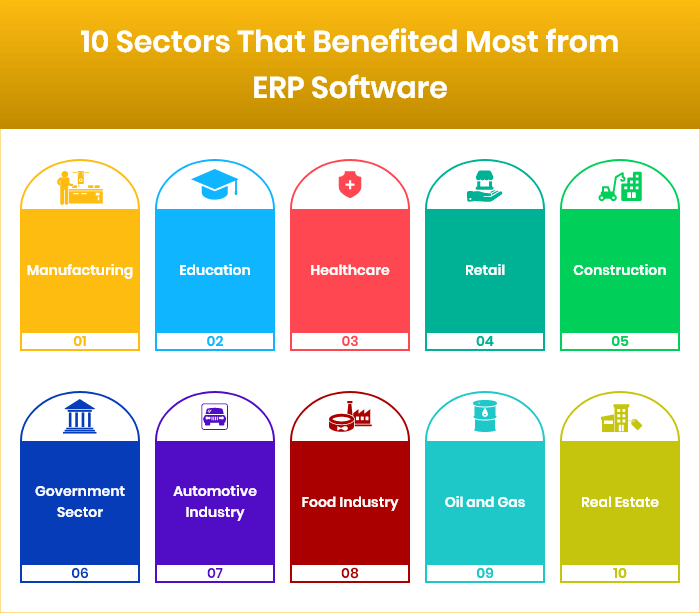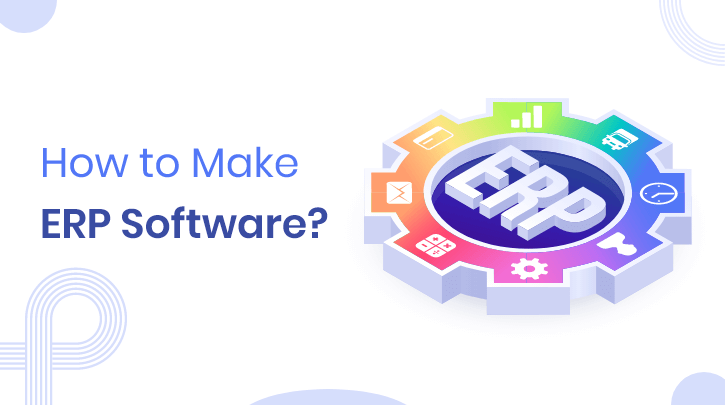
Which Industries Use ERP Software for Management and Why?
Enterprise resource planning software is a business management software that helps an organization to collect, store, manage, and interpret data from business activities. Not only does ERP provide an updated view of core business processes but also helps in tracking business resources such as raw material, cash, and production capacity. The widespread growth of Enterprise resource planning shows the importance of ERP to fortunate organizations.
ERP Systems experienced good growth in the 1990s, but due to “ the year 2000 problem” also known as Y2K problem, many companies replaced the old system with ERP. Since then, ERP has been experiencing growth at a lightning speed and the total market size is expected to reach 50$ billion by 2024. ERP system grew 9% in 2019, resulting in a market value of 39$ billion.
Asia-Pacific region is among the fastest to adopt ERP system technologies with the market expected to achieve a CAGR of 13.2% by 2026. While North-America tops the list with over 10% billion market size.
Why ERP for Industries?
ERP is a central business framework powered by market features such as widespread digital acceptance, booming global trade and large volumes of data to be monitored, maintained and analysed. With the implementation of ERP systems, industries can take advantage of Enhanced business reporting, Improved inventory cost, Boosted cash flow, cost-saving and better customer service. The global demand can be seen by the massive success of ERP software across diverse industries.
Let’s look at Top 10 Industries where the ERP System is very crucial-

1. ERP FOR MANUFACTURING
The manufacturing industry is highly dynamic and competitive in nature, making it imperative for such organizations to have an integrated solution that can increase productivity, decrease costs, increase revenue and profitability. But, most importantly allow the company to make precise, informed, and strategic decisions.
Some of the advantages of the manufacturing ERP software are-
- Quick usage at 50 percent, increased functionality at 46 per cent and total cost of ownership (TCO) at 43 per cent are the potential patterns of ERP in the manufacturing industry.
- During ERP deployment, 66 percent of organizations have encountered operational disturbances.
- Top 3 explanations for ERP program implementation: First, Improving the efficiency of the company (64 per cent). Second, the growth of the company (57 per cent), and Third, for the elimination of working capital (57 per cent).
2. ERP FOR EDUCATION
The replacement with a unified ERP of the older legacy systems brings a rapid and quantifiable change in the administration process. The program provides a range of resources to modernize the campus, as well as to enhance the preparation and management of student enrollment practices, lecture sessions, classes, library, customer service, etc.
To greatly increase the efficiency of allocating and operating academic resources, the educational ERP system automates and streamlines all processes functioning within the limits of the university.
Benefits of ERP system for Education are-
- ERP system furnishes a seamless workflow by eliminating paperwork and human errors.
- School Management ERP systems can store important information in bulk for administrative tasks such as fee information, admission tasks and demographic details.
- ERP software also provides portals to access information such as student details, assessments and time-tables. Besides that, Teachers can also share details with students such as syllabus update, course execution and home-work.
3. ERP FOR HEALTHCARE
ERP for healthcare is a technical program composed of modules designed to track data and facilitate collaboration within an organization between departments. Employees are therefore able to work more with this, which improves performance and productivity. Moreover, the use of hospital management ERP systems improves the pace of the provision of health care services, both internally and externally.
Reading Recommendation-
How to Develop an ERP Software for the Hospital Industry?
Thus, it is also useful to incorporate hospital management ERP software within the scope of healthcare. There are several aspects in which ERP can support the healthcare industry-
- It is possible to monitor and better use patient records and data archives.
- Automation of processes removes the potential for replication of data and decreases errors.
- Superior management of customer relationships (CRM) leads to improved patient care, cost savings, and more opportunities.
- Electronic Health Records (EHR) replacement of manual charting improves the efficacy of accessing and exchanging information.
- With all the data available on a single system, cloud ERP for healthcare prompts improved care and recovery plans for patients in healthcare units.
- The financial controls are dramatically stronger since the information is structured, integrated and more available to all concerned.
4. ERP FOR RETAIL
Retail is one of the world’s fastest-growing industries right now. But as the market is rising, so are the problems with handling it. A variety of sub-sectors make up the retail sector and it is imperative that they be managed effectively to sustain or raise profits. Fortunately, retail ERP could be the solution in the retail sector.
Here are the benefits of choosing retail ERP–
- Implementation of ERP contributed to the improvement of business processes for 95 per cent of organizations.
- Reduced process time, improved communication and a centralized data system are the top three advantages of ERP as realized by organisations. In a group of businesses that introduced ERP, the average ROI period (opened in a new tab) was just over 2.5 years.
5. ERP FOR CONSTRUCTION
ERP software for construction is a business solution that uses data from various construction processes such as accounting/financial management, contract management, equipment/inventory management, human resource management, Customer Relationship Management (CRM), scheduling and submissions to provide effective analytics.
Construction ERP software combines different software systems into one complete solution so that building managers can have resources to effectively manage the entire life cycle of a project, including-
- Due to the availability of cloud-based services, 94 percent of companies operating within the ERP construction industry say their protection is improved.
- In the ERP industry, 22 percent of companies looking for sustainable solutions look at SaaS as a viable alternative. On some stage, almost any business that chooses ERP experiences cost savings.
- The most common reason 16% of companies listed for introducing a new ERP was to replace an existing version or update a legacy system.
6. ERP FOR GOVERNMENT SECTOR
Comprehensive accounting, warehousing, inventory, logistical components are required for any useful ERP platform. However, these essential elements are improved for a private sector ERP through the implementation of more specialized criteria in ERP in the Government Sector.
This is primarily due to principles of law, legislation, and policy that are not applicable in the private sector. Thus, four of the most noticeable gaps between ERP for civil and ERP for Government Sector platforms are-
- Transparency in data
- Handling of Legislation
- Native comprehensive security elements
7. ERP FOR AUTOMOTIVE INDUSTRY
Automotive ERP provides a broad range of strong and agile business management skills that can handle and incorporate each department of an enterprise efficiently to facilitate smooth information flow. Automotive ERP allows workers to work confidently while reducing mistakes, helping them to meet project deadlines so that each job is completed in a disciplined manner.
Nowadays seamless integration of technology can provide the enterprise with a competitive advantage. As the review found:
- As the primary objective behind investing in an ERP, 76 per cent considered operational efficiency.
- 12% were inspired by worldwide business assistance.
- Five per cent was driven by growth,
- 4% is inspired by cost reduction.
8. ERP FOR FOOD INDUSTRY
In terms of demand, output and export of food products, the food processing industry is one of the largest sectors and plays an important role in the economy’s growth. The food processing industry in India covers a wide range of products such as vegetables, fruits, milk products, mineral water, cocoa products and other products such as alcoholic beverages, plantation of fisheries, meat & poultry etc.
To handle the inventory recipes, sales & purchase order process, control production, the Food industry ERP process is very useful.
Benefits of ERP for food industry are–
- Improved quality management in the different phases of the production process.
- From start to finish, it can handle supplier details.
- It can improve the productivity of production & reduce costs.
- Enhancing the method of supply chain management.
- Meet new specifications & new roles to meet the needs of the organization.
- All sorts of sales & transactions are easily handled by accounting.
- It handles the management of inventory & gets the right operational efficiency as well.
- Helps to reduce waste of materials & shortage of raw materials.
- Maintain the quality of food throughout the whole process.
Online purchases are expected to take over 20 percent of overall grocery retail by 2022 and hit $100 billion in customer sales, according to the Food Marketing Institute.
9. ERP FOR OIL AND GAS
India is the world’s third-largest user of oil and gas, controlling more than 1/3rd of Indian energy consumption. Therefore, the uncertainties involved in multi-geographic locations are sure to take a toll on any oil and gas company.
Advantages of ERP for Oil and Gas are:
- The control of properties
- Control of Content & Inventory
- Handling Documents
- Control of Data
- Visibility into main processes in real-time
- Enhanced quality of processes
- Improved control of the supply chain
- Reduced cost of operations
- Effective Control of Systems
10. ERP FOR REAL ESTATE
In simple terms, with the aid of the latest technologies, ERP software incorporates, streamlines, and automates all business processes such as sales, HR, procurement, inventory, etc., It provides informative and relevant data primarily to increase revenue and minimize operating costs for the organization.
Business processes (usually known as modules) are adapted and modified to suit the requirements of the enterprise. In the real estate market, IT was estimated at USD 5.03 trillion in 2016 and is forecasted to reach USD 8.91 trillion by 2021, with a CAGR of 12.1 trillion by 2021.
Benefits for ERP system for Real Estate–
- Improve the process through various modules and streamline it.
- Present all the details in a centralized place.
- To help users understand details on every module, generate reports.
- Automate processes that usually take hours to run like GST, have numerous tools incorporated with the aid of mobile apps and are accessible on-the-go.
- Possess real-time business intelligence (BI) dashboards to help make smarter daily business decisions.
CONCLUSION
Thanks to ERP software solutions that make processes simple and effective, a lot of ERP projects today are far more competitive than in the past. With today’s vast cloud software available on the market. Along with the above-mentioned ERP software advantages, there is no denying that ERP is a big deal.
Tasks benefiting from ERP system include–
- Sales forecasting, which enables optimization of inventory.
- The chronological history of every transaction in every field of service by relevant data collection.
- Tracking of order, from acceptance to fulfillment
- Revenue management, from invoice to receipt of cash
- Matching sales orders, receipts of inventory, and costs (what the vendor invoiced)
If you still have questions about Why ERP for Industries? We are here for you. Maven Cluster is an award-winning ERP Software Development Company. We provide top-notch ERP solutions to industries and businesses. Contact us now for leading-edge ERP solutions.


